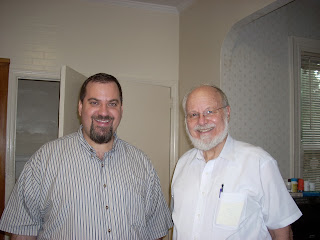Kosher by Ingredients?
 Kashrut.org is a long-standing site belonging to R Yitzchak Abadi and his sons. The site has an extensive Q&A section about kashrut with many unusual answers, which indicate that in many cases hechsherim aren't necessary, and that that one can be "kosher by ingredients", so to speak. For example, this answer that allows eating certain sandwiches at Subway.
Kashrut.org is a long-standing site belonging to R Yitzchak Abadi and his sons. The site has an extensive Q&A section about kashrut with many unusual answers, which indicate that in many cases hechsherim aren't necessary, and that that one can be "kosher by ingredients", so to speak. For example, this answer that allows eating certain sandwiches at Subway.Unsurprisingly, the site is somewhat controversial, but I know people who depend on it. (Leaving aside the kashrut issues themselves, I personally have issues with the site because of the one or two word answers often given that can lend themselves to ambiguousness.)
There's one reader comment on the site from 2003 that has a bit of cult status. That comment, which attempted to explain the rationale of the Abadis' stance, is by Dr Marc Shapiro, of Seform Blog fame, and author of books like "The Limits of Orthodox Theology" and the just released "Changing the Immutable". I won't reproduce the whole long comment in this post, which you can read here, but I'll try to summarize:
The Rashba wrote that a non-kosher ingredient added to kosher food is only batel b'shishim if it was added accidentally. Dr Shapiro writes that "If you look at any of the standard Yoreh Deah books you will find, however, that the halakhah is not in accordance with this Rashba. Rather, any time the goy puts a small amount of treif into the food it is batel, even if it is intentional on his part." He then explains that until the 2nd half of the 20th century, the community did not rule according to the Rashba, and the change to the chumrah of the Rashba is what allowed the rise of Kashrut agencies. If one accepts that ingredients added intentionally are batel b'shishim, than most manufactured products that aren't blatantly treif are acceptable, and one can eat certain foods in many non-kosher restaurants, since one not worry about trace amounts of treif ingredients.
When I wrote to Shapiro a couple of years ago asking him for more sources, he was a little more ambiguous than in that original comment, and wrote that "it depends what books you look at, since this is actually a dispute. It all comes down to how you are taught the material. some believe that we don't pay attention to the Rashba and others think that we should try to be machmir. When you learn Yoreh Deah this is covered." This left me wondering if he regretted ever writing that 2003 comment.
In any case, this topic came up again a couple of days ago at a Yom Tov meal, and I thought it was worthy of a blog post to stimulate discussion.
Is there any merit to this argument? Is it indeed true that normative practice was NOT according to the Rashba until at least the mid-20th century? Do we really need the kashrut agencies for anything except meat?
Disclaimer: I'm not trying to ask halacha l'ma'aseh, or induce anyone to follow the Abadis' opinions. I just find the whole topic fascinating and worthy of discussion.

I have also heard of an interpretation where the definition of intentional is looser than used by contemporary kashrut agencies. Say a company purchases vegetable shortening or lard, whichever is cheaper at the moment. Then adding lard to the recipe would not count as intentional, since they aren't choosing lard in particular. If they used lard and not vegetable shortening because of flavoring or texturing considerations, then the use of lard would be considered intentional and it would not be nullified. (If the lard was more than 1/60th of course the product would still be treif.)
ReplyDelete